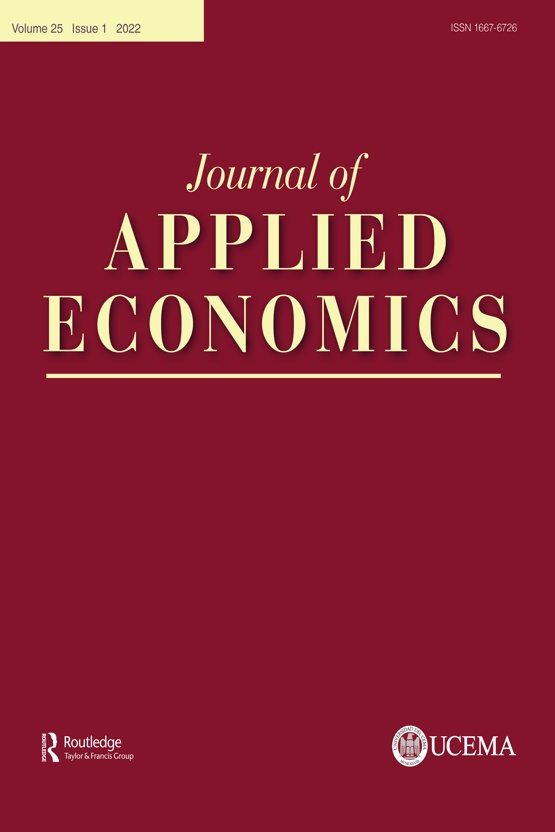Submit a Manuscript to the Journal
Journal of Applied Economics
For an Article Collection on
Health Issues, Biodiversity and Climate Change: Individual Perceptions and Risk Aversion
Manuscript deadline
20 September 2024


Article collection guest advisor(s)
Emmanuelle Augeraud-Véron,
BSE, University of Bordeaux, France
[email protected]
Raphaël Chiappini,
BSE, University of Bordeaux, France
[email protected]
Health Issues, Biodiversity and Climate Change: Individual Perceptions and Risk Aversion
This special issue aims to examine the linkages between health issues, biodiversity loss and climate change, and how they influence individual perceptions and risk aversion.
Health issues, such as infectious diseases but also non communicable diseases (mental stress, respiratory infections, …), are closely related to biodiversity loss, climate change and natural disasters, as they depend on the interactions between humans, animals and the environment. Biodiversity loss and climate change, in turn, are affected by human activities, such as land-use changes (i.e. deforestation, urbanization and agriculture). Moreover, health issues, biodiversity loss and climate change have significant impacts on individual preferences, beliefs and behaviors. This special issue invites original research papers that apply empirical methods (with or without theoretical framework) from applied economics to address these complex and interrelated issues.
The topics of interest include, but are not limited to, the following:
- Land use changes interaction with other drivers of global change, such as climate change, biodiversity loss altering the susceptibility and vulnerability to infectious diseases or non-communicable diseases.
- The economic determinants and consequences of individual and collective responses to infectious diseases or non-communicable diseases, biodiversity loss and climate change, such as prevention, adaptation, mitigation and innovation.
- Environmental transition and its impacts on the exposure to health risks.
- Management and governance of the environmental transition to reduce health risks.
- Spatial externalities in the context of biodiversity loss and climate change and their consequences on human health.
- The role of individual perceptions, beliefs, consumptions habits and risk aversion related to health issues, biodiversity loss and climate change, and how learning about the adverse outcomes modifies health exposure.
- Induced health consequences of natural disasters and environment perception.
- The design and evaluation of policy instruments and incentives to promote health in the context biodiversity loss and climate change.
All manuscripts submitted to this Article Collection will undergo a full peer-review; the Guest Advisor for this collection will not be handling the manuscripts (unless they are an Editorial Board member). Please review the journal scope and author submission instructions prior to submitting a manuscript.
The deadline for submitting manuscripts is 20 September 2024.
Keywords:
- Health economics
- Biodiversity loss
- Individual preferences
- Infectious diseases
- Health and climate change
Emmanuelle Augeraud-Véron is Professor of Economics at the University of Bordeaux (BSE) since 2017, where she leads the Environmental Economics team (Economics of Socio-Ecosystems). Her research interests include mathematical epidemiology, environmental economics, health and growth economics. She has published over 40 papers in international journals in economics, mathematics and mathematical epidemiology.
Raphaël Chiappini is Associate Professor of Economics at the University of Bordeaux since 2016. He is deputy head of the research program “International Economics, History, Finance” of Bordeaux School of Economics. His research interests include international trade and capital flows, global health, and public policy evaluation. He has published over 15 papers in international journals in economics and management.
Conflict of Interest Disclosure
The Guest Advisors do not have any conflict of interest to disclose.
Benefits of publishing open access within Taylor & Francis
Global marketing and publicity, ensuring your research reaches the people you want it to.
Article Collections bring together the latest research on hot topics from influential researchers across the globe.
Rigorous peer review for every open access article.
Rapid online publication allowing you to share your work quickly.
Looking to Publish your Research?
Find out how to publish your research open access with Taylor & Francis Group.
Choose open accessSubmission Instructions
All manuscripts submitted to this Article Collection will undergo desk assessment and peer-review as part of our standard editorial process. Guest Advisors for this collection will not be involved in peer-reviewing manuscripts unless they are an existing member of the Editorial Board. Please review the journal Aims and Scope and author submission instructions prior to submitting a manuscript.